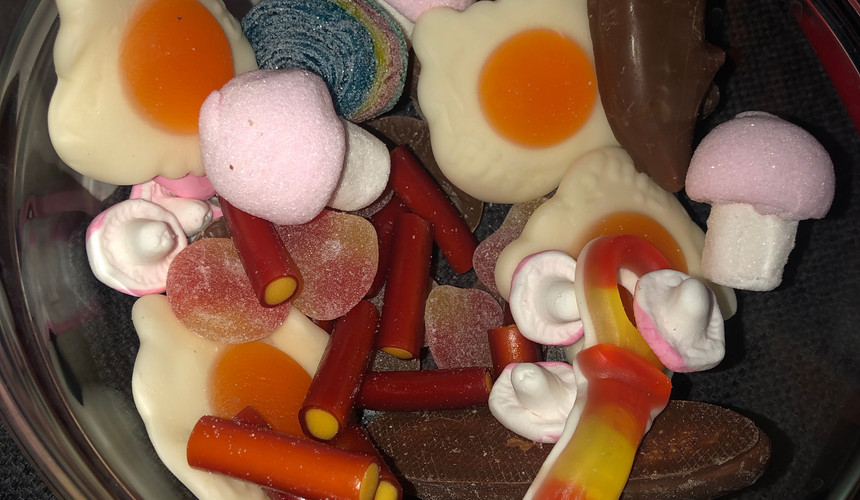12 Things Americans Could Learn from Danes
- Lindley Bach

- May 3, 2019
- 7 min read
Updated: May 10, 2021

Moving to a foreign country is such a refreshing experience. It allows you to ask questions about your own culture and another. In the last year, I have spent many hours replaying interactions I have had with people in the streets and wondering why they acted in specific ways. Certain things I thought were universal, are not, and others that you wouldn’t expect are.
I am very thankful that we ended up in Denmark. Denmark is “the happiest country on earth,” according to the 2016 UN World Happiness Report. For me, safety is also a big thing. I’m usually extra cautious and maybe even anxious in new countries. But I felt safe here from the moment I stepped off the airplane into Scandinavian paradise.
Danes are sweet people. They almost all speak perfect English, which is very convenient for an ex-pat. Life here is more straightforward and moves slower than it does in the US. Danish people are also very proud people.
Danish flags are flown everywhere, practically on every house, and at every single birthday party. Denmark is a small country of five million people, which is a little bigger than Los Angeles. Danes do a lot of things differently, and these are the things that I think Americans could adopt from Danish culture.
12 Things Americans Could Learn from Danes
Universal Free Healthcare
The healthcare system is probably one of the most recognized characteristics of Denmark. It only took a month or two, and Rasmus and I were assimilated into the Danish system, paying Danish taxes and recipients of Danish healthcare benefits.
On my first doctor visit, I had to call, walk in, and swipe my Danish CPR card (below). The facility was clean, quick, and efficient. No deductible, no nada. So easy and “free” seemingly. I love that the government makes this service available to everyone.
Free Higher Education
As an American with two degrees, this was one of the things that shocked me the most. Higher education is FREE in Denmark. Actually, not only is it free, but the country pays its students to go to school.
Can you imagine? What a concept. I think they pay full-time students the equivalent of around $1400 a month to go to school. Everyone deserves to be educated if they choose, and Danes have this right.

Local Produce
Through the winter they don’t have the greatest varieties of fruits and veggies, but the ones they do have are definitely local and more organic than those we find in most US supermarkets.
I have become extremely accustomed to peeling carrots, which was a foreign concept to me before. I must have eaten a handful of dirt before I realized their carrots are not power cleaned like they are in the states!
Rasmus’ Aunt Pernille made us a salad with fresh “fennikel” or fennel, and I fell in love! In Denmark, fennikel is so crisp and sweet. You can taste the freshness in all the meat, fruit, and veggies in Denmark.
And their government has extremely tough regulations on pesticides/hormones etc. Get on board USA!
Danish Hygge
Hygge [hue-gah] is a Danish word, which means:
“an atmosphere of warmth, well-being, and coziness, when you feel at peace and able to enjoy the simple pleasures of being in the moment”
I love this concept; it is almost like a religion in Denmark. This is how Danes bond with one another. It is usually shared between close friends and family, or lovers and almost always involves candy, beer, chips, and candles. It might also involve cards (beer and wine) or some sort of indoor activity.
I was jokingly advised by other ex-pats when I moved here to get myself a butt pad, for all of the sitting I’d be doing. Danes love to sit and chat and pass the time in the present.
I’ve had many meals over the last year that surpassed the three or four-hour mark. Hygge can even be an adjective, as in “the dinner was very hyggligt.”
Bike Paths
Another notable thing about Denmark is the number of people who bike. In Copenhagen, you’ll find large parking lots in the middle of the city that looks like bike graveyards, but all the bikes are shiny and new. There are bike paths everywhere, they run along every single street.
These paths are so pristine that on a slope, you could roll a quarter for miles. Also, bikers are king, they are allowed to go the opposite direction on one-way streets and basically bike anywhere they want.
Our sweet neighbor, Louise, loaned me her bike for the duration of our stay, and I fell in love with it! Many people don’t have cars, as they are wildly expensive—you have to pay taxes on them each year even after you own them, and parking in DK can be a monster.
Rasmus won a car midseason (for a basketball win), and on my first driving outing, I got a $150 ticket for parking in the wrong lot.
Second Languages
According to the Copenhagen CB 86% of Danes speak English, and 58% of the Danes speak more than one foreign language – typically German, French or Spanish - which is well above the EU average of 25%. English is their common tongue, as they have to use it when traveling anywhere else in the world.
Their language training is second to none, Rasmus has some young cousins who are learning English. They start teaching kids in school around age 5 and by around 11, they will speak or mostly understand English.
I love that they start kids young. And not only do many Danes speak English, but many speak three or four languages!

Celebrations
Danes. Know. How. To. Party. I loved celebrating Christmas with Rasmus’s family. It was filled with hygge, games, and beer.
We also had the opportunity to go to his Aunt Helle’s 50th birthday, which was quite the celebration! 50th birthdays, like any decade marker, are huge almost wedding-like celebrations.
Helle’s celebration was filled with wonderful drinks, catered food, speeches, dancing, and singing. Many Danish celebrations are filled with song. I love listening to their Danish songs.
Danish Christmas is marked by holding hands and dancing around the tree while singing, but they also sing on birthdays and other occasions.
Societal Benefits
I mean, I already touched on health care and education. But the benefits do not stop there. Denmark is widely cited as one of the world’s most livable places. It has the world’s highest level of income equality according to the OECD.
The full-time Danish workweek is 37 hours, and according to the Danish Holiday Act, everyone is entitled to five weeks of vacation plus nine public holidays. Parental leave (maternity and paternity joint) is 52 weeks, to be split up how the parents see fit. The government also pays you to have kids!

Danes have a right to economic equality, and there are lots of safety nets set up by the government for unemployment and you can even receive benefits if you cannot pay rent, etc.
Denmark is the least corrupt country in the world
The benefits are endless, I literally learn about new programs every week. Oh, and for the 5th year in a row, Denmark is the least corrupt country in the world according to Transparency International's annual Corruption Perception Index.
Safety
For me, traveling to a new country always heightens my radar. I am sensitive to the fact that I need to be hyper-aware and not trusting of strangers. But life in Denmark has been largely uneventful in terms of danger.
Denmark ranked second, behind Iceland, on the Safest Countries in the World Index. We always see women walking alone at night. Guns are illegal in Denmark, and shootings are almost unheard of. I have never felt unsafe in my time here which is a huge sell for me.
Sweets and Treats
I would be amiss if I didn’t point out the incredible bakers and candy makers in Denmark. As we were leaving the US last year, Rasmus really wanted me to experience some of his most fond childhood memories, including smelling the bakeries every morning at 5 AM.
And we did, in the first three months I gained 10 lbs., so I had to swear off the good stuff LOL. But their bakers make incredible bread, cakes, muffins you name it!
If you are ever in Denmark look for a Lagkagehuset and get a christianshavnerkage, thank me later. That is my favorite thing in Denmark. Also, flødeboller, which is a hard chocolate treat filled with marshmallowy gooey goodness!
Danes are also known for their love of licorice. If you are visiting someone, you can expect that after 9 PM there will be a big bowl of Danish candies maybe including but not limited to: hard and soft licorice, dark chocolates, Turkish peppers, Haribo gummy mix, bolsjer or marzipan.
Our good friend Vibeke is also an oven angel and made Rasmus’ team incredible homemade cakes. Okay, I need to stop before I start drooling, currently on Whole30 LOL. Oh and all you can eat sushi-- that's a big thing!

Candles
I have never lit so many candles in my life. In the last year, I think we went through at least 100.
The Danish winter is cold and dark, so for one reason or another, candles have been a huge part of Danish hygge and wintertime.
Any occasion is an occasion to light candles in Denmark. TV time? Candles. Games? Candles. Dinner? Candles. Bored? Candles. And I sort of love it. I will take my love of candles back with me.
The first guests we had over to our apartment, Uncle Fini and Aunt Pernille, brought over candles for our dinner. And I thought it was the sweetest gesture. Look close, note all the candles in my photos!
Prickly Pear Attitude
I don’t quite know how to label this one. For my Danish friends, prickly pear is a cactus fruit we have in the Southwest where I am from. Truly, on the outside, Danish people seem pretty cold and off-putting.
They don’t see the need for what we would consider friendly elevator chit-chat or common smiling at strangers. They are no bullshit; I mean that in the nicest way. But once you get to know someone, they become extremely warm and friendly.
I experienced this with people who would attend Rasmus’ games. At the beginning of the season I greeted them with my common US tactics of charming people, shaking hands, and introducing myself, they were unamused.
But by the end of the season, they were coming to me with hugs… Prickly pears! I came to appreciate this way of being, no need to bullshit anyone. If you aren’t interested in being someone’s friend, why pretend? We have a very “pretend-ie” way of being in the US sometimes.
I have learned a lot from my time in Denmark, and plan to take many of these things back to the US with me. I love my Dane, and learning about Danish culture and Rasmus at the same time has been a blessing.
Listening to him speak Danish is one of his many charms. I am glad I’ve been able to witness his culture firsthand. Spring is beautiful in Denmark if you ever get the chance to go, definitely plan a spring or summer visit!











































































































Comments